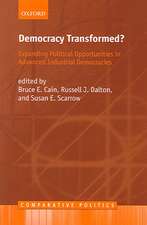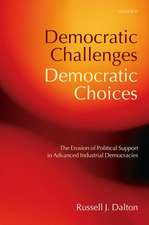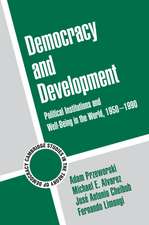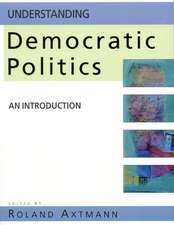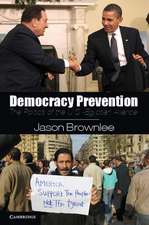Democracy and Moral Conflict
Autor Robert B. Talisseen Limba Engleză Paperback – 16 feb 2011
| Toate formatele și edițiile | Preț | Express |
|---|---|---|
| Paperback (1) | 325.03 lei 6-8 săpt. | |
| Cambridge University Press – 16 feb 2011 | 325.03 lei 6-8 săpt. | |
| Hardback (1) | 435.67 lei 6-8 săpt. | |
| Cambridge University Press – 9 sep 2009 | 435.67 lei 6-8 săpt. |
Preț: 325.03 lei
Nou
Puncte Express: 488
Preț estimativ în valută:
62.20€ • 66.51$ • 51.86£
62.20€ • 66.51$ • 51.86£
Carte tipărită la comandă
Livrare economică 17 aprilie-01 mai
Preluare comenzi: 021 569.72.76
Specificații
ISBN-13: 9780521183901
ISBN-10: 0521183901
Pagini: 216
Dimensiuni: 152 x 229 x 12 mm
Greutate: 0.3 kg
Editura: Cambridge University Press
Colecția Cambridge University Press
Locul publicării:Cambridge, United Kingdom
ISBN-10: 0521183901
Pagini: 216
Dimensiuni: 152 x 229 x 12 mm
Greutate: 0.3 kg
Editura: Cambridge University Press
Colecția Cambridge University Press
Locul publicării:Cambridge, United Kingdom
Cuprins
Introduction; 1. The problem of deep politics; 2. Against the politics of omission; 3. Folk epistemology; 4. Justifying democracy; 5. Epistemic perfectionism; Works cited.
Recenzii
Review of the hardback: 'Talisse sees profound moral and religious conflict in our political life that threatens democracy, and makes impossible effective defenses by appeal to shared values. He advances an important alternative: our common commitment to sound beliefs should lead us all to endorse democratic politics. This is a fine work of public philosophy in the tradition of J. S. Mill and John Dewey.' Gerald Gaus, University of Arizona
Review of the hardback: 'Robert Talisse has provided us with a timely, original, and unapologetic defense of constitutional democracy. It is, he says, the only form of government suited to persons who are already committed in their everyday lives to giving reasons for their beliefs. Artfully blending careful philosophical analysis with contemporary illustrations and accessible prose, Democracy and Moral Conflict makes an authentically democratic and powerfully reasoned case for democracy.' John C. P. Goldberg, Harvard University
Review of the hardback: 'Robert Talisse argues that democracy comes closer than any other political system to instantiating the norms of the folk epistemology which all citizens share. Insofar as we care about the truth, we have a reason to remain committed to democracy, even when the stakes are highest. An engaging read, this book makes an important contribution to the growing discussion of democracy's epistemic virtues.' David A. Reidy, University of Tennessee
'Talisse's brief book is a minor masterpiece of concise argumentation in which he advances a genuinely novel defense of democracy.' Terrence Ball, Notre Dame Philosophical Reviews
'Democracy and Moral Conflict is a highly accessible work, written in a wonderfully lucid manner with lively examples drawn from contemporary American politics.' Ethics
'Robert B. Talisse's book, Democracy and Moral Conflict, remains one of the most important attempts to solve the problem of democratic legitimacy in the context of the pluralism that characterizes modern society.' Logos & Episteme
Review of the hardback: 'Robert Talisse has provided us with a timely, original, and unapologetic defense of constitutional democracy. It is, he says, the only form of government suited to persons who are already committed in their everyday lives to giving reasons for their beliefs. Artfully blending careful philosophical analysis with contemporary illustrations and accessible prose, Democracy and Moral Conflict makes an authentically democratic and powerfully reasoned case for democracy.' John C. P. Goldberg, Harvard University
Review of the hardback: 'Robert Talisse argues that democracy comes closer than any other political system to instantiating the norms of the folk epistemology which all citizens share. Insofar as we care about the truth, we have a reason to remain committed to democracy, even when the stakes are highest. An engaging read, this book makes an important contribution to the growing discussion of democracy's epistemic virtues.' David A. Reidy, University of Tennessee
'Talisse's brief book is a minor masterpiece of concise argumentation in which he advances a genuinely novel defense of democracy.' Terrence Ball, Notre Dame Philosophical Reviews
'Democracy and Moral Conflict is a highly accessible work, written in a wonderfully lucid manner with lively examples drawn from contemporary American politics.' Ethics
'Robert B. Talisse's book, Democracy and Moral Conflict, remains one of the most important attempts to solve the problem of democratic legitimacy in the context of the pluralism that characterizes modern society.' Logos & Episteme
Descriere
If confronted with a democratic result they regard as intolerable, should citizens revolt or pursue democratic means of social change?






